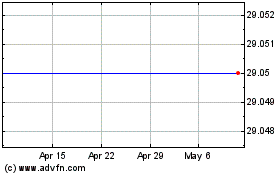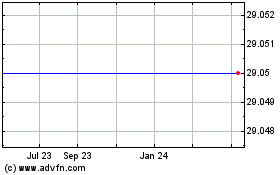By Don Clark, Dana Cimilluca and Robert McMillan
Michael Dell, founder of what once was the leading PC maker,
stepped out of the limelight when he took Dell Inc. private two
years ago. Now he is back with what promises to be the biggest tech
deal in history, a $67 billion acquisition of EMC Corp.
Mr. Dell, in announcing the cash-and-stock deal to buy EMC,
vowed to play a more central role in technology used by
corporations. EMC would add the broadest line of data-storage
hardware as well as data-center software from VMware Inc. and other
high-profile businesses to Dell's offerings.
The roughly $25 billion leveraged buyout of Mr. Dell's company
in 2013 enabled him to maneuver outside the public eye, and by some
accounts he has revitalized Dell's core business. The stakes held
by Mr. Dell, his investment vehicle and private-equity firm Silver
Lake--which is teaming up on the deal--have roughly doubled in
value to about $11 billion since then, according to the people.
Still, Dell's business--and that of EMC--are under relentless
assault. Growth has stalled in mature categories of computer
servers, data storage, networking gear and other equipment that
keeps corporations running.
Mobile devices have eaten into PC sales, and cloud computing
gives companies what can be a cost-effective alternative to
purchasing and maintaining their own hardware and software.
Competition increasingly comes from deep-pocketed rivals such as
Amazon.com Inc., Microsoft Corp. and Alphabet Inc., the corporate
parent of Google, as well as a host of aggressive startups and
cut-rate Chinese manufacturers.
Consolidation is a common response to shifting markets, but the
history of such tie-ups isn't always encouraging, especially in the
realm of technology.
For instance, Hewlett-Packard Co. took years to extract profits
from its $25 billion acquisition of Compaq in 2002, and the deal
shoehorned H-P more tightly in what became a commodity business.
The company now plans to split in two.
Silicon Valley veterans were quick to point to the perils ahead
as Dell tries to integrate EMC.
"Integrations like this are extremely distracting and confusing
and can take a lot of time," said Steve Herrod, VMware's former
chief technology officer and managing director with the investment
firm, General Catalyst Partners.
Meg Whitman, CEO of Dell competitor Hewlett-Packard Co.,
predicted in a memo to H-P employees that the two companies and
their customers will face "chaos" in combining product lines,
workforces and sales channels.
The pressures on EMC were evident in a projection Monday of its
third-quarter revenue and profits that was slightly lower than Wall
Street anticipated.
But Mr. Dell and Joe Tucci, EMC's longtime CEO, said the
benefits outweighed the challenges. For one thing, the deal would
allow Dell to exploit an arrangement pioneered by EMC, known as
converged infrastructure, to sell computing, storage and networking
equipment as an easy-to-install bundle. VMware, 80%-owned by EMC,
has a head start in several categories of software that are growing
quickly, the two men said.
"You get an unbelievably strong position when you put Dell and
EMC together in that very important, growing space," Mr. Dell said
in an interview.
Mr. Tucci touted the ability to combine the two businesses away
from the scrutiny of the public markets.
EMC, based in Hopkinton, Mass., has been under pressure from
investors to better exploit the value of VMware, which accounts for
roughly half EMC's market value but 35% of its revenue.
Mr. Dell, 50 years old, won a bitter, yearlong fight against
some prominent investors to take Dell private, expressing
satisfaction at giving up quarterly conference calls and other
trappings of managing a public company.
Chris Bulger, managing partner with the Boston investment bank
Bulger Partners, said combining the companies in a private
structure would have better odds of success than those of public
companies like International Business Machines Corp. that have been
trying to change their business. "Public markets aren't a good
place for radical restructuring," he said.
Dell said funding for the EMC deal would come from EMC's cash on
hand and new common equity from Mr. Dell, Silver Lake and others. A
new tracking stock linked to VMware shares will also be
created.
Dell will also likely need to absorb more than $40 billion in
debt financing to help pay for the purchase, according to people
familiar with that matter.
Such borrowing would entail big interest payments, siphoning
away money that otherwise could be spent on developing new
products, noted Toni Sacconaghi, analyst at Sanford C.
Bernstein.
Mr. Dell said his company had been able to pay down its debts
quickly and predicted repeating that feat in 18 to 24 months once
the EMC transaction closes.
And the company's ability to convince a group of banks to put up
the debt financing is a sign of confidence in the transaction, the
people familiar with the deal said. That would make it the biggest
acquisition-debt financing package since Verizon Communications
Inc. lined up roughly $50 billion to help it take complete
ownership of its wireless arm in a $130 billion deal two years
ago.
Banks including J.P. Morgan Chase & Co. and Credit Suisse
Group AG will initially put up funds with an aim of being paid back
closer to the time of the deal's closing with proceeds from
investment-grade and junk-bond and loan sales, the people said.
That represents a bold bet by Dell, and its lenders, on
financial markets that have been volatile and credit investors who
have balked at funding a number of risky takeovers in the past
several weeks.
To help pay for the equity portion of the deal, Mr. Dell, his
investment arm, Silver Lake and Temasek--an investment firm based
in Singapore--will contribute an additional $3.5 billion, according
to a person familiar with the matter.
Excluding the tracking stock, Mr. Dell and affiliates would own
about 70% of the combined company's equity, similar to the current
Dell ownership structure.
The deal for EMC announced Monday was valued by Dell at $33.15 a
share, a 28% premium over EMC's closing price before The Wall
Street Journal reported last week that the companies were in talks
to merge.
EMC holders will receive $24.05 a share in cash in addition to
tracking stock linked to a portion of EMC's interest in the VMware
business.
EMC shares rose nearly 2% to $28.36 Monday. VMware's stock
declined 8% to 72.28, despite reporting preliminary results above
Wall Street expectations. Some analysts expressed concerns that
issuing tracking stock would effectively create dilution for VMware
shareholders.
VMware will remain a publicly traded company with Dell as
controlling shareholder. Though some analysts had speculated Dell
might sell off some of its VMware shares to finance the
transaction, Mr. Dell said it planned to keep the stock.
"Over time we could increase our stake," Mr. Dell said.
David Benoit and Lisa Beilfuss contributed to this article.
Write to Don Clark at don.clark@wsj.com, Dana Cimilluca at
dana.cimilluca@wsj.com and Robert McMillan at
Robert.Mcmillan@wsj.com
Subscribe to WSJ: http://online.wsj.com?mod=djnwires
(END) Dow Jones Newswires
October 12, 2015 20:08 ET (00:08 GMT)
Copyright (c) 2015 Dow Jones & Company, Inc.
Global X Funds (NYSE:EMC)
Historical Stock Chart
From Mar 2024 to Apr 2024

Global X Funds (NYSE:EMC)
Historical Stock Chart
From Apr 2023 to Apr 2024
